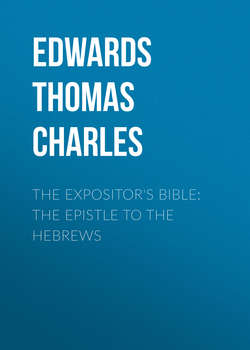Читать книгу The Expositor's Bible: The Epistle to the Hebrews - Edwards Thomas Charles - Страница 6
CHAPTER V
THE IMPOSSIBILITY OF RENEWAL
Оглавление“Of Whom we have many things to say, and hard of interpretation, seeing ye are become dull of hearing. For when by reason of the time ye ought to be teachers, ye have need again that some one teach you the rudiments of the first principles of the oracles of God; and are become such as have need of milk, and not of solid food. For every one that partaketh of milk is without experience of the word of righteousness; for he is a babe. But solid food is for full-grown men, even those who by reason of use have their senses exercised to discern good and evil. Wherefore let us cease to speak of the first principles of Christ, and press on unto perfection; not laying again a foundation of repentance from dead works, and of faith toward God, of the teaching of baptisms, and of laying on of hands, and of resurrection of the dead, and of eternal judgment. And this will we do, if God permit. For as touching those who were once enlightened and tasted of the heavenly gift, and were made partakers of the Holy Ghost, and tasted the good word of God, and the powers of the age to come, and then fell away, it is impossible to renew them again unto repentance; seeing they crucify to themselves the Son of God afresh, and put Him to an open shame. For the land which hath drunk the rain that cometh oft upon it, and bringeth forth herbs meet for them for whose sake it is also tilled, receiveth blessing from God: but if it beareth thorns and thistles, it is rejected and nigh unto a curse; whose end is to be burned.” – Heb. v. 11–vi. 8 (R.V.).
In one of the greatest and most strange of human books the argument is sometimes said “to veil itself,” and the sustained image of a man battling with the waves betrays the writer’s hesitancy. When he has surmounted the first wave, he dreads the second. When he has escaped out of the second, he fears to take another step, lest the third wave may overwhelm him. The writer of the Epistle to the Hebrews has proved that Christ is Priest-King. But before he starts anew, he warns his readers that whoever will venture on must be prepared to hear a hard saying, which he himself will find difficult to interpret and few will receive. Hitherto he has only shown that whatever of lasting worth was contained in the old covenant remains and is exalted in Christ. Even this truth is an advance on the mere rudiments of Christian doctrine. But what if he attempts to prove that the covenant which God made with their fathers has waxed old and must vanish away to make room for a new and better one? For his part, he is eager to ascend to these higher truths. He has yet much to teach about Christ in the power of His heavenly life.83 But his readers are dull of hearing and inexperienced in the word of righteousness.
The commentators are much divided and exercised on the question whether the Apostle means that the argument should advance or that his readers ought to make progress in spiritual character.84 In a way he surely means both. What gives point to the whole section now to be considered is the connection between development of doctrine and a corresponding development of the moral nature. “For the time ye ought to be teachers.”85
83
Chap. v. 11.
84
Chap. vi. 1.
85
Chap. v. 12.
